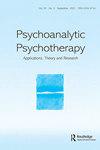新冠肺炎大流行开始时的治疗遭遇:心理动力治疗师向远程心理治疗过渡的经验
IF 1.2
Q1 PSYCHOLOGY, PSYCHOANALYSIS
引用次数: 14
摘要
新冠肺炎疫情从2020年初开始在世界各地蔓延,使社会许多领域陷入瘫痪。一夜之间,由于社交距离和封锁,整个社会被迫改变了生活方式。对治疗师来说,疫情意味着不再可能进行面对面的治疗,许多人转而通过电话、在线音频或视频链接进行不同形式的同步远程通信。本研究的目的是探索心理动力治疗师在被迫过渡到远程心理治疗的过程中的经验。在新冠疫情开始时和一年的随访中,有五名治疗师接受了采访。通过运用主题分析和现象学方法对数据进行分析。起初,治疗师们在技术和安全问题上举步维艰。失去治疗室和接触非语言细微差别的机会导致了与患者的接触受损和更肤浅的对话。治疗师们体验到心理动力心理治疗的本质受到了影响,即使远程心理治疗可以提供一些新的机会。一年后,许多困难仍然存在,但治疗师们制定了更好的应对策略,并回到了治疗的重点。这项研究的一个含义是,远程心理治疗需要整合到心理治疗的培训和监督中。本文章由计算机程序翻译,如有差异,请以英文原文为准。
Therapeutic encounters at the onset of the COVID-19 pandemic: psychodynamic therapists’ experiences of transition to remote psychotherapy
The COVID-19 pandemic crippled many parts of society as it spread throughout the world beginning in early 2020. Overnight, whole societies were forced to change their way of life, because of social distancing and lockdowns. For therapists, the pandemic meant that in-person sessions were no longer possible and many switched to different forms of synchronous remote communication by telephone, online audio or video link. The aim of this study was to explore psychodynamic therapists’ experiences over time of forced transitions to telepsychotherapy. Five therapists were interviewed at the beginning of the pandemic and at a one-year follow-up. The data were analysed by applying thematic analysis with a phenomenological approach. Initially, the therapists struggled with technical and safety issues. The loss of the therapy room and of access to non-verbal nuances contributed to impaired contact with the patients and more superficial conversations. The therapists experienced that the very nature of psychodynamic psychotherapy was affected, even if telepsychotherapy could give some new opportunities. One year later many of the difficulties remained, but the therapists developed better coping strategies and were back to the therapy focus. One implication of this study is that telepsychotherapy needs to be integrated into psychotherapy training and supervision.
求助全文
通过发布文献求助,成功后即可免费获取论文全文。
去求助
来源期刊

Psychoanalytic Psychotherapy
PSYCHOLOGY, PSYCHOANALYSIS-
CiteScore
1.30
自引率
37.50%
发文量
22
期刊介绍:
Psychoanalytic Psychotherapy publishes original contributions on the application, development and evaluation of psychoanalytic ideas and therapeutic interventions in the public health sector and other related applied settings. The Journal aims to promote theoretical and applied developments that are underpinned by a psychoanalytic understanding of the mind. Its aims are consonant with those of the Association for Psychoanalytic Psychotherapy in the NHS (APP in the NHS) in promoting applied psychoanalytic work and thinking in the health care system, across the whole age range.
 求助内容:
求助内容: 应助结果提醒方式:
应助结果提醒方式:


